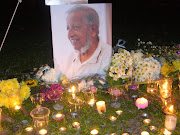It was one of three contempt of court cases brought by the Attorney-General of Singapore.
The other case involved Gopalan Nair.
And i just blogged earlier today about the third case involving the "kangaroo court" activists who were found in contempt of court and will be sentenced on Thursday.
WSJA fined $25,000Reports from AFP, Reuters and AP,
By Zakir Hussain, Correspondent
25 Nov 08, ST Online
THE High Court has found Wall Street Journal Asia (WSJA) to be in contempt of court and fined it $25,000 - the highest ever fine meted out for such a case in Singapore.
Justice Tay Yong Kwang on Tuesday said the fine would serve to denounce the conduct of the newspaper, 'a repeat offender', and hopefully deter future transgressions.
He also ordered the Hong Kong-based publication to pay costs of $30,000.
Previous fines for contempt of court involving newspapers have been in the thousands of dollars. The highest - $10,000 - was meted out to American academic Christopher Lingle in 1995 for an article he wrote in the International Herald Tribune that insinuated the judiciary was compliant.
In the present case, the Attorney-General took Dow Jones - the publisher of the WSJA - to court over three articles published in the newspaper in June and July this year.
The first was an editorial on Singapore's democracy, arising out of a May hearing to assess damages that Singapore Democratic Party chief Chee Soon Juan and others had to pay Prime Minister Lee Hsien Loong and Minister Mentor Lee Kuan Yew for libel.
The second was a letter by Dr Chee, in reply to a rebuttal of that editorial by MM Lee?s press secretary.
The third article was another editorial, on the International Bar Association?s Human Rights Institute's report on the Singapore judiciary in July.
At a hearing on Tuesday morning, Justice Tay found that all three articles contained insinuations that the judiciary was biased, impartial and lacked independence.
The articles also implied that the judiciary was subservient to Minister Mentor Lee and the People's Action Party, and was a tool for silencing political dissent.
These allegations had the inherent tendency to interfere with the administration of justice and risked undermining public confidence in the courts, Justice Tay said.
His ruling came three weeks after he heard arguments from Attorney-General Walter Woon and Dow Jones' lawyer, Senior Counsel Philip Jeyaretnam.
In a 42-page written judgment which he summarised in court, Justice Tay noted that although the paper's earlier instances of contempt of court were committed about two decades ago - in 1985 and 1989 - 'that is not a very long period of time in the context of corporate history'.
In 1985, when the paper was called the Asian Wall Street Journal, Dow Jones and then-editor Fred Zimmerman were fined $6,000 and $2,000 respectively for a report on the conviction of then-Workers' Party leader J.B. Jeyaretnam.
In 1991, Dow Jones and then-editor Barry Wain were each fined $4,000 for implying that a judge hearing a libel case was biased towards Mr Lee Kuan Yew. Justice Tay also cited three other aggravating factors against the WSJA:
One, the offending articles appeared in the span of three weeks, in a respectable journal with a wide and sophisticated readership.
Two, the constant refrain of the imputations against the judiciary's independence destablised the rule of law and threatened to bring down the reputation of Singapore.
Three, the WSJA had not offered any apology but maintained that the articles were not in contempt.
WSJA has seven days from Tuesday to pay the fine.
Said a Dow Jones spokesman: 'We are currently reviewing the decision.'
Wall Street Journal Asia Publisher Fined In Singapore
SINGAPORE (AFP)--The publisher of the Wall Street Journal Asia was found in contempt of court Tuesday and ordered to pay more than $16,000 in damages for questioning Singapore's judicial integrity.
The judgment against Dow Jones Publishing Company (Asia) Inc. is the latest court ruling against critics of the Singapore government.
High Court Justice Tay Yong Kwang found the publisher in contempt for two editorials: "Democracy in Singapore," published on June 26 this year, and " Judging Singapore's Judiciary," which appeared on July 15.
He said that a letter that the business daily published in July by Chee Soon Juan, secretary general of the opposition Singapore Democratic Party, or SDP, was also in contempt, and fined the newspaper a total of SGD25,000 ($16,490).
"In my opinion, all three publications, individually as well as collectively, contained insinuations of bias, lack of impartiality and lack of independence and implied that the judiciary is subservient to Mr Lee and/or the PAP and is a tool for silencing political dissent," the judge wrote.
He was referring to Singapore's founding father Lee Kuan Yew, and the People's Action Party, or PAP, which has ruled the city-state since 1959.
Tay noted that the editorials and the letter appeared within a relatively short period of less than three weeks while a defamation case involving Chee and Lee continued, and while charges against an American blogger, Gopalan Nair, were also before Singapore's courts.
"The three publications...are in contempt of court because the allegations by way of insinuations clearly possess the inherent tendency to interfere with the administration of justice," the judge wrote.
"A judiciary which is not impartial and independent is as good as salt that has lost its flavor."
Last month, a Singapore judge ordered the SDP party, Chee - who is bankrupt - and his sister, to pay $610,000 in damages for defaming Lee and his son, Prime Minister Lee Hsien Loong.
In September, the blogger Nair was sentenced to three months' jail for accusing a Singapore judge of "prostituting herself." He made the comment in a blog about the case involving Chee and the Lees.
Tay said there were aggravating factors, including the fact that Dow Jones had been found in contempt on two earlier occasions in Singapore.
The publisher also failed to apologize, and maintained that the publications weren't in contempt, he said.
Defense counsel Philip Jeyaretnam declined to comment on the case, referring inquiries to Dow Jones.
A spokesman for the publisher said only that they were reviewing the court's decision. In a statement issued during the hearing, Dow Jones said it was defending its "right to report and comment on matters of international interest, including matters concerning Singapore."
Singapore's leaders have won hundreds of thousands of dollars in damages from defamation suits filed against critics and foreign publications.
International human rights groups have accused the country's leaders of using courts to stifle dissent, but the leaders argue that suing for defamation is necessary to protect their reputations from unfounded attacks.
Singapore fines WSJ for contempt of court
SINGAPORE, Nov 25 (REUTERS) - A Singapore court has found the Wall Street Journal in contempt of court for publishing three articles relating to Singapore's judiciary, and fined it S$25,000 , court documents said on Tuesday.
Singapore's attorney general brought contempt of court charges against the publisher of the Asian edition of the Wall Street Journal, News Corp's Dow Jones & Co, and two of the newspaper's editors, Daniel Hertzberg and Christine Glancey.
The case was brought for two editorials and a letter written by opposition leader Chee Soon Juan about Singapore's judiciary in the newspaper.
"The three publications, read individually or collectively, are in contempt of court because of the allegations by way of insinuations clearly possess the inherent tendency to interfere with administration of justice," said Justice Tay Yong Kwang in his written judgement.
Tay said the fine, to be paid in seven days, was supposed to be a deterrent and denunciation of the paper's actions.
The court documents said the previous highest penalty for contempt of court was S$10,000.
A Dow Jones spokesman told Reuters the company was currently reviewing the court's decision.
During the trial, Singapore's attorney general argued that the Wall Street Journal was waging a 20-year campaign to smear the reputation of Singapore's courts. But Philip Jeyaretnam, a lawyer acting for the newspaper, said the claim was not true.
Singapore first took legal action against the Wall Street Journal in 1985 for contempt of court for an editorial commenting on the trial of late Singapore opposition leader J.B. Jeyaretnam. The Wall Street Journal apologised and was fined $7,600, according to newspaper reports.
Singapore leaders have won damages, settlements and apologies in the past from foreign media groups when they reported on local politics, including The Economist, the Far Eastern Economic Review, Bloomberg News and the Financial Times.
Singapore rules Journal in contempt of court
By ALEX KENNEDY, Associated Press Writer
SINGAPORE - Singapore's High Court ruled the Wall Street Journal Asia in contempt of court for publishing two editorials and a letter to the editor that the government says damaged the reputation of the country's judicial system.
The court also fined the newspaper 25,000 Singapore dollars ($16,400).
Justice Tay Yong Kwang ruled Tuesday against the newspaper and two of its editors, three weeks after Attorney General Walter Woon argued the editorials published in June and July questioned the judiciary's independence from Prime Minister Lee Hsien Loong and the ruling People's Action Party. Not meting out punishment in this case would undermine the country's rule of law, the court said.
The letter to the editor was written by Chee Soon Juan, head of the opposition Singapore Democratic Party.
The editorials and the letter "contained insinuations of bias, lack of impartiality and lack of independence and implied that the judiciary is subservient to Mr. Lee and/or the PAP and is a tool for silencing political dissent," Tay wrote in the ruling.
"There can be no doubt that allegations of the nature mentioned above would immediately cast doubts on the judiciary in Singapore and undermine public confidence."
The newspaper's lawyer, Philip Jeyaretnam, was not immediately available for comment. The Wall Street Journal is published by Dow Jones & Co., a part of News Corp.
Singapore's leaders have sued journalists and political opponents several times in past years for alleged defamation. They have won lawsuits and damages against Bloomberg, the Economist and the International Herald Tribune.
Human Rights Watch called on Singapore last month to stop using defamation lawsuits to stifle criticism and bankrupt opposition politicians, citing the High Court's decision in October to order Chee and his party to pay $416,000 to Lee and his father, Lee Kuan Yew, in damages stemming from a 2006 defamation case.
Government leaders justify suing political opponents, saying it is necessary to defend their personal and professional reputations since it bears on their ability to govern properly and command respect from Singaporeans.














No comments:
Post a Comment